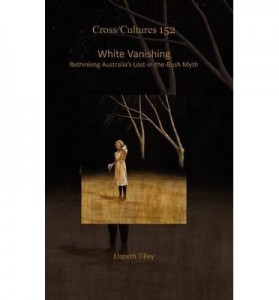 A book by an English & Media Studies staff member has been described as “a powerful statement of anti-colonialism” by an international reviewer.
A book by an English & Media Studies staff member has been described as “a powerful statement of anti-colonialism” by an international reviewer.
In a review just published in Ariel: A review of international English literature, Associate Professor Elspeth Tilley’s 2012 book White Vanishing is called “a valuable document within the arena of Australian cultural historiography”.
White Vanishing is a longitudinal critical survey of a prevalent trope within Australian culture, the ‘lost in the bush’ myth. The book argues for reading this mythology (popularised in movies such as Picnic at Hanging Rock) differently to literal or nationalistic interpretations, by focusing on its often overlooked racial, gendered and colonialist ideology.
The reviewer, Australian fiction writer Giulia Giuffrè, notes White Vanishing is “well researched and thorough in its survey of the literature in and about the topic,” containing “a great deal of useful material and thought-provoking arguments” as well as insights that are “perceptive and shaming”. It is also, Giuffrè notes, something of a “juggernaut”.
Dr Tilley, surprisingly, agrees with the latter criticism. “Absolutely, it’s a warship of a book – and in a way it had to be. It’s putting an argument that although not controversial within particular academic circles is not likely to be at all popular with many Australians. It’s suggesting that the common characterisation of Australian culture as favouring ‘fairness’ might be better understood in terms of fairness of skin than fairness in treating others. If you’re going to make a critique like that you need your evidence thoroughly marshalled. So my aim with the book was to put the supportability of the argument beyond doubt – and then elsewhere in other ways I can have the liberty of perhaps expressing it in more subtle terms.”
Dr Tilley also agreed that the book was inherently anti-colonial. “Absolutely the book has a political stance – everything is political, including academic research and, as I point out in the book, creative writing, film, theatre and media. My argument is that any kind of creative or discursive output is enhanced if it recognises its political stance consciously, rather than pretending neutrality.”
Dr Tilley said that, since the book’s publication, she had noticed some shifts in public understanding of the ‘lost in the bush myth’ in Australia. “There have now been some fantastic artistic and creative deconstructions of the myth, particularly in the theatre. Sisters Grimm’s The Sovereign Wife used parody to skewer the ‘lost in the bush myth’ in ways that were much more entertaining than my book – but culturally speaking, we need both forms of engagement with our mythology, the detailed deconstruction and the lampooning, and each contributes to the possibility and the interpretation of the other.”
White Vanishing is published by Rodopi and available at: http://www.rodopi.nl/senj.asp?BookId=CC+152
Post-script! Another review of White Vanishing (in the journal Critical Race and Whiteness Studies) has just been published and is available at: http://www.acrawsa.org.au/files/ejournalfiles/212Iyer20141.pdf Reviewer Sumedha Iyer of The University of New South Wales says White Vanishing is “engaging and rigorous in its analysis, and does a great deal to fill the epistemological gap in disappearance mythology in Australian literature. Even for readers who are not au fait with literary textual analysis or whiteness theory, Tilley’s book makes it easy to trace the insidious and enduring inheritance of the white vanishing trope in terms of its origins in the oppressive function of colonialism.”